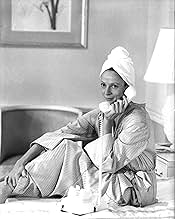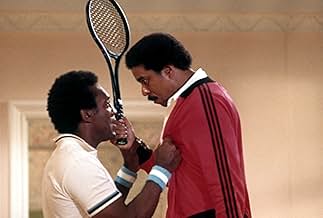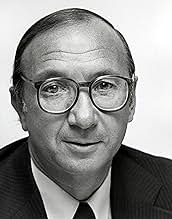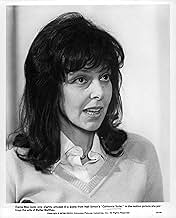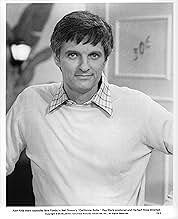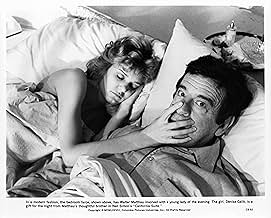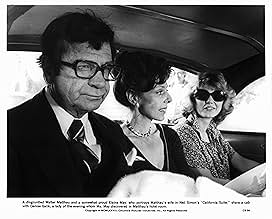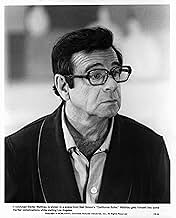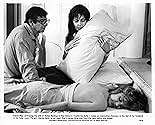VALUTAZIONE IMDb
6,2/10
8800
LA TUA VALUTAZIONE
Aggiungi una trama nella tua linguaMisadventures of four groups of guests at the Beverly Hills Hotel.Misadventures of four groups of guests at the Beverly Hills Hotel.Misadventures of four groups of guests at the Beverly Hills Hotel.
- Regia
- Sceneggiatura
- Star
- Vincitore di 1 Oscar
- 5 vittorie e 10 candidature totali
Herb Edelman
- Harry Michaels
- (as Herbert Edelman)
Jerrold Ziman
- Man on Phone
- (as Jerry Ziman)
Recensioni in evidenza
Neil Simon focuses his attention on a variety of people at a hotel in this 1978 comedy hit.
Walter Matthau certainly has a penchant as a hotel guest. Remember him with Maureen Stapleton and several other ladies in another hotel farce comedy-drama?
Matthau, as always, is hilarious when he attempts to hide a hooker from his wife. It seems that Elaine May is always the naive victim in films. Remember her in 1972's "The Heartbreak Kid?"
The real acting kudos here goes to Maggie Smith for a gem of a supporting Oscar-winning performance in this film. Smith plays an actress at the hotel who has been nominated for an Oscar. A win would mean a tremendous comeback for her. Naturally, she loses. How many people have won Oscars for playing an Oscar loser in a film? Judy Garland accomplished the opposite in 1954 in "A Star is Born." In the film she is an actress who wins the academy award but in real-life competition lost it to Grace Kelly for "The Country Girl." Only the lord knows why.
Smith is just grand as she prances around the room delivering memorable one-liners. This is just a gem of a film.
Walter Matthau certainly has a penchant as a hotel guest. Remember him with Maureen Stapleton and several other ladies in another hotel farce comedy-drama?
Matthau, as always, is hilarious when he attempts to hide a hooker from his wife. It seems that Elaine May is always the naive victim in films. Remember her in 1972's "The Heartbreak Kid?"
The real acting kudos here goes to Maggie Smith for a gem of a supporting Oscar-winning performance in this film. Smith plays an actress at the hotel who has been nominated for an Oscar. A win would mean a tremendous comeback for her. Naturally, she loses. How many people have won Oscars for playing an Oscar loser in a film? Judy Garland accomplished the opposite in 1954 in "A Star is Born." In the film she is an actress who wins the academy award but in real-life competition lost it to Grace Kelly for "The Country Girl." Only the lord knows why.
Smith is just grand as she prances around the room delivering memorable one-liners. This is just a gem of a film.
I've always liked this movie, ever since I saw it in the theater as a 12-year-old. (With my church youth group, no less -- what were they thinking??) It's flawed, but generally fun, and I like the sun-soaked, palm-fringed atmosphere.
Maggie Smith is the undisputed standout. Her portrayal is brilliant and she and Michael Caine fling one-liners at each other with biting abandon. I've always liked both Jane Fonda and Alan Alda, so I enjoy their storyline too, though their exchanges seem forced and a little too clever. I'm a Cosby fan, but his scenes with Richard Pryor are uncomfortable -- it's troubling that the film's only black characters are relegated to brute physical comedy. Walter Matthau and Elaine May do a great job, but I never liked the hooker skit -- not sure why.
I buy very few films, but I do own this one, and over the years I've watched it so many times I know all the lines...
Maggie Smith is the undisputed standout. Her portrayal is brilliant and she and Michael Caine fling one-liners at each other with biting abandon. I've always liked both Jane Fonda and Alan Alda, so I enjoy their storyline too, though their exchanges seem forced and a little too clever. I'm a Cosby fan, but his scenes with Richard Pryor are uncomfortable -- it's troubling that the film's only black characters are relegated to brute physical comedy. Walter Matthau and Elaine May do a great job, but I never liked the hooker skit -- not sure why.
I buy very few films, but I do own this one, and over the years I've watched it so many times I know all the lines...
Neil Simon's 1978 film, California Suite, is four vignettes of couples descending upon Los Angeles at Oscar time: one couple (Maggie Smith and Michael Caine) for the Oscar ceremonies, two couples for vacation (Richard Pryor, Gloria Gifford, Bill Cosby, Sheila Frazer) one couple for a bar mitzvah (Walter Matthau and Elaine May), and one divorced couple (Alan Alda and Jane Fonda) to discuss their daughter.
The film is a mix of comedy, slapstick, and drama, with the Fonda-Alda segment witty but serious, the Matthau-May segment hilarious, the Cosby-Pryor segment slapstick, and the Smith-Caine segment a classic. Their conversation in the hotel suite before the Oscar ceremony is one of the best acted, best written scenes ever written. "I'm a dark horse," Smith says of her Oscar nomination, entering the room in a gown. "They must have seen the dress," Caine concludes.
This is probably the most fully fleshed-out story, with the truth behind their marriage emerging as Smith descends into drunkenness later on. That and the Matthau-May vignettes are the best, with the Alda-Fonda scene coming off as somewhat dated today. The weakest is the Pryor-Crosby.
Entertaining - if you don't feel like watching the whole thing, just watch the Caine-Smith and Matthau-May.
Bill Cosby and Richard Pryor try their best as doctor friends who are having an awful time on their vacation with their wives. It's just not that funny, despite them both being extremely likable.
Alan Alda and Jane Fonda do well in their dramatic story of separated couple meeting after nine years to discuss their child. Their segment is too short to really have an impact, might have worked well as a feature film. It's not all that involving.
Michael Caine and Maggie Smith are both excellent in their little segment, with Smith portraying an actress who's up for the academy award. Caine plays her show off gay husband. The two stars really shine in an otherwise average story, not all that interesting.
The film is a mix of comedy, slapstick, and drama, with the Fonda-Alda segment witty but serious, the Matthau-May segment hilarious, the Cosby-Pryor segment slapstick, and the Smith-Caine segment a classic. Their conversation in the hotel suite before the Oscar ceremony is one of the best acted, best written scenes ever written. "I'm a dark horse," Smith says of her Oscar nomination, entering the room in a gown. "They must have seen the dress," Caine concludes.
This is probably the most fully fleshed-out story, with the truth behind their marriage emerging as Smith descends into drunkenness later on. That and the Matthau-May vignettes are the best, with the Alda-Fonda scene coming off as somewhat dated today. The weakest is the Pryor-Crosby.
Entertaining - if you don't feel like watching the whole thing, just watch the Caine-Smith and Matthau-May.
Bill Cosby and Richard Pryor try their best as doctor friends who are having an awful time on their vacation with their wives. It's just not that funny, despite them both being extremely likable.
Alan Alda and Jane Fonda do well in their dramatic story of separated couple meeting after nine years to discuss their child. Their segment is too short to really have an impact, might have worked well as a feature film. It's not all that involving.
Michael Caine and Maggie Smith are both excellent in their little segment, with Smith portraying an actress who's up for the academy award. Caine plays her show off gay husband. The two stars really shine in an otherwise average story, not all that interesting.
"California Suite" was written by Neil Simon and, as with most films for which he acted as scriptwriter, it is based on one of his stage plays. The main idea is similar to that in his earlier "Plaza Suite", namely that of following the adventures of different guests staying in the same hotel, in this case in Los Angeles. It is a "portmanteau film" with four separate stories and the hotel providing the one point of contact between them. (An earlier film with a similar premise was "The VIPs", based around several groups of travellers passing through Heathrow Airport).
Hannah, a New Yorker, has flown out to California to meet her former husband Bill and to discuss the future of their teenage daughter. Diana Barrie, a British actress, and her husband Sidney are in town because she has been nominated for the Academy Award for Best Actress. Two doctors from Chicago (with the unlikely names of Dr. Chauncey Gump and Dr. Willis Panama) are on vacation with their wives. And Marvin, a Jewish businessman from Philadelphia, and his wife Millie have come out for their nephew's Bar Mitzvah.
The "Visitors from Chicago" story, by far the weakest of the four, is little more than a not-very-amusing slapstick comedy based around the idea that the four characters, especially the two men, cannot move a hand or a foot without breaking something or injuring themselves. I wondered if the American Medical Association were considering suing Simon for the libellous insinuation that they would grant a licence to practise medicine to two such idiots. The Marvin story is a farce based around Marvin's increasingly desperate attempts to hide from his wife that there is another woman in his hotel room, with whom he spent the previous night. (They were unable to travel together and she flew out a night later to join him). Farce can often be desperately unfunny on screen; the cinema version of "No Sex Please, We're British", for example, gives little hint that it was based on one of the most successful West End stage plays of the seventies. Walter Matthau, however, plays Marvin so well (with good support from Elaine May as his wife) that this segment becomes highly entertaining.
Simon, of course, is from New York and most of his plays are set in his home city, but here he makes a rare foray to the West Coast. As his fellow New Yorker Woody Allen had done in "Annie Hall" the previous year, Simon takes the opportunity for some comments on the culture wars between America's Atlantic and Pacific seaboards. Hannah and Bill can be taken as representing the East and West Coast respectively. She is a driven, sharp-tongued, neurotic and workaholic New Yorker, he is a gentler, more laid-back Californian (although possibly an adopted rather than a native son of the Golden State). Jane Fonda (looking even more stunning at the age of 40 than she had done ten years earlier in "Barbarella", especially when she gets to frolic on the beach in a bikini) and Alan Alda both play their parts to perfection; she in particular gets to deliver some of Simon's most barbed lines, like "I don't have a lifestyle. I have a life." and "You're the sort of person who'd solve the world hunger problem by having them all eat out. Preferably in a good Chinese restaurant!" I could certainly imagine Allen writing lines like that.
The fourth story is a bit more serious. Maggie Smith won the Academy Award for Best Supporting Actress for her performance as Diana, thus going one better than her character, who loses out, and I must say it was well deserved, although she might have faced some stiff competition had Fonda been nominated. (This was the year when Fonda won "Best Actress" for "Coming Home", so I don't suppose she minded too much). This is the most serious of the four stories. Sidney is gay, and he and Diana are in a "lavender marriage", possibly a more daring plot line in 1978 than it would be today. Although they love one another in a non- sexual way, Diana has entered into this arrangement because her image as a happily married woman is good for public relations, but Sidney's indiscreet behaviour, however, has started to put this image at risk. Even though she has had a successful stage career, Diana's failure to win the Oscar is a blow to her rather fragile self-esteem, and despite her curious relationship with Sidney she finds herself relying on him for emotional support. Given his normal screen image as a red-blooded ladies' man, Michael Caine might seem an odd choice to play Sidney, but in fact he is very good.
Simon's plays can vary in quality when transferred to the screen. For example, "Barefoot in the Park" (which also starred Fonda, not nearly as good as she is here) today comes across as horribly mannered and dated. "California Suite", however, is one of the better ones. One of the weaknesses of the portmanteau form is that it does not allow for the depth of plot and character development which is possible in a film based around a single story. It also has its strengths, however, one of which is its ability to combine various moods in a single film. "California Suite" is normally categorised as a comedy, and for three- quarters of the time it is, although the tone of the comedy varies from slapstick to farce to verbal wit. In the fourth story, however, it becomes a more serious character study. It enables director Herbert Ross to demonstrate several contrasting styles of film-making, featuring contrasting styles of acting, without the contrasts ever seeming jarring. 7/10, which would have been higher had the "Visitors from Chicago" story been of similar quality to the others.
Hannah, a New Yorker, has flown out to California to meet her former husband Bill and to discuss the future of their teenage daughter. Diana Barrie, a British actress, and her husband Sidney are in town because she has been nominated for the Academy Award for Best Actress. Two doctors from Chicago (with the unlikely names of Dr. Chauncey Gump and Dr. Willis Panama) are on vacation with their wives. And Marvin, a Jewish businessman from Philadelphia, and his wife Millie have come out for their nephew's Bar Mitzvah.
The "Visitors from Chicago" story, by far the weakest of the four, is little more than a not-very-amusing slapstick comedy based around the idea that the four characters, especially the two men, cannot move a hand or a foot without breaking something or injuring themselves. I wondered if the American Medical Association were considering suing Simon for the libellous insinuation that they would grant a licence to practise medicine to two such idiots. The Marvin story is a farce based around Marvin's increasingly desperate attempts to hide from his wife that there is another woman in his hotel room, with whom he spent the previous night. (They were unable to travel together and she flew out a night later to join him). Farce can often be desperately unfunny on screen; the cinema version of "No Sex Please, We're British", for example, gives little hint that it was based on one of the most successful West End stage plays of the seventies. Walter Matthau, however, plays Marvin so well (with good support from Elaine May as his wife) that this segment becomes highly entertaining.
Simon, of course, is from New York and most of his plays are set in his home city, but here he makes a rare foray to the West Coast. As his fellow New Yorker Woody Allen had done in "Annie Hall" the previous year, Simon takes the opportunity for some comments on the culture wars between America's Atlantic and Pacific seaboards. Hannah and Bill can be taken as representing the East and West Coast respectively. She is a driven, sharp-tongued, neurotic and workaholic New Yorker, he is a gentler, more laid-back Californian (although possibly an adopted rather than a native son of the Golden State). Jane Fonda (looking even more stunning at the age of 40 than she had done ten years earlier in "Barbarella", especially when she gets to frolic on the beach in a bikini) and Alan Alda both play their parts to perfection; she in particular gets to deliver some of Simon's most barbed lines, like "I don't have a lifestyle. I have a life." and "You're the sort of person who'd solve the world hunger problem by having them all eat out. Preferably in a good Chinese restaurant!" I could certainly imagine Allen writing lines like that.
The fourth story is a bit more serious. Maggie Smith won the Academy Award for Best Supporting Actress for her performance as Diana, thus going one better than her character, who loses out, and I must say it was well deserved, although she might have faced some stiff competition had Fonda been nominated. (This was the year when Fonda won "Best Actress" for "Coming Home", so I don't suppose she minded too much). This is the most serious of the four stories. Sidney is gay, and he and Diana are in a "lavender marriage", possibly a more daring plot line in 1978 than it would be today. Although they love one another in a non- sexual way, Diana has entered into this arrangement because her image as a happily married woman is good for public relations, but Sidney's indiscreet behaviour, however, has started to put this image at risk. Even though she has had a successful stage career, Diana's failure to win the Oscar is a blow to her rather fragile self-esteem, and despite her curious relationship with Sidney she finds herself relying on him for emotional support. Given his normal screen image as a red-blooded ladies' man, Michael Caine might seem an odd choice to play Sidney, but in fact he is very good.
Simon's plays can vary in quality when transferred to the screen. For example, "Barefoot in the Park" (which also starred Fonda, not nearly as good as she is here) today comes across as horribly mannered and dated. "California Suite", however, is one of the better ones. One of the weaknesses of the portmanteau form is that it does not allow for the depth of plot and character development which is possible in a film based around a single story. It also has its strengths, however, one of which is its ability to combine various moods in a single film. "California Suite" is normally categorised as a comedy, and for three- quarters of the time it is, although the tone of the comedy varies from slapstick to farce to verbal wit. In the fourth story, however, it becomes a more serious character study. It enables director Herbert Ross to demonstrate several contrasting styles of film-making, featuring contrasting styles of acting, without the contrasts ever seeming jarring. 7/10, which would have been higher had the "Visitors from Chicago" story been of similar quality to the others.
I know that this film does not get much acclaim, and it is indeed a rather inconsistent affair, but the fourth segment featuring the late great Walter Matthau (whom we unfortunately lost last Saturday)is absolutely hilarious and is by far and away the best in the film. Matthau is able to pull off the "hide the hooker" from my wife skit so convincingly that one could almost view this as actually happening in real life. I know of few comic actors who would not overplay this scene, and it is a great testament to the man himself.
Lo sapevi?
- QuizDiana Barrie (Dame Maggie Smith) says that she wishes David Niven could accept her award for her because he would be witty and charming. In the play on which the movie is based, the character says "Michael Caine," but it was changed when Caine was cast as her husband.
- BlooperThe movie begins with Maggie Smith's character's movie-within-movie, which shows her in a small airplane apparently about to crash. It is being shown as the in-flight entertainment as she flies on a commercial flight into Los Angeles. In reality, commercial airlines never show movies with airplane crashes in them.
- Citazioni
Hannah Warren: You're worse than a hopeless romantic. You're a hopeful one.
- Curiosità sui creditiIn the opening credits, famous 70s artworks of British artist David Hockney are featured. The painting before Elaine May's name is entitled "Portrait of an Artist (Pool with two figures), 1972" and features a swimming pool with the Hollywood hills in the backdrop. The "two figures", both male, one swimming and the other standing over watching have been mysteriously edited out of the picture for some unknown reason.
I più visti
Accedi per valutare e creare un elenco di titoli salvati per ottenere consigli personalizzati
- How long is California Suite?Powered by Alexa
Dettagli
- Data di uscita
- Paese di origine
- Sito ufficiale
- Lingua
- Celebre anche come
- Neil Simon's California Suite
- Luoghi delle riprese
- 21932 Pacific Coast Highway, Malibu, California, Stati Uniti(24932 Pacific Coast Highway, Malibu, California)
- Aziende produttrici
- Vedi altri crediti dell’azienda su IMDbPro
Botteghino
- Lordo Stati Uniti e Canada
- 29.000.000 USD
Contribuisci a questa pagina
Suggerisci una modifica o aggiungi i contenuti mancanti

